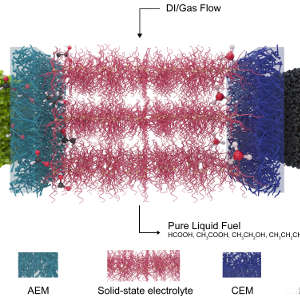Using AI to control energy for indoor agriculture
30 September 2024
Published online 2 September 2019
Efficient conversion of carbon dioxide into pure liquid fuels can be achieved by using solid electrolytes, instead of liquid.

Demin Liu, Chuan Xia 2019
Enlarge image
Liquid electrolyte systems are well established for CO2 reduction, but the resulting liquid fuels tend to be mixed with salts, which must be separated via further energy-intensive processes. Inspired by recent developments in solid-state batteries, a team of researchers, led by Haotian Wang at Rice University in the USA, chose to investigate the potential of solid electrolytes to produce pure products from CO2.
They showed that their electrocatalytic system, containing a solid bismuth catalyst, could continuously convert CO2 into pure, highly concentrated formic acid for more than 100 hours with no degradation in the catalyst. They then incorporated a copper catalyst in their system to produce other electrolyte-free fuels including acetic acid, ethanol and n-propanol.
“Given the wide variety of solid electrolytes available, we expect the approach could be extended to the production of other liquid fuels, and to other electrocatalytic reactions,” says Wang’s postdoctoral researcher, Chuan Xia, who wrote the team’s paper published in Nature Energy. “This may shift the current energy and chemical industry away from fossil fuel dependence into renewable sources like solar and wind.”
doi:10.1038/nmiddleeast.2019.124
Xia, C. et al. Continuous production of pure liquid fuel solutions via electrocatalytic CO2 reduction using solid-electrolyte devices. Nat. Energy https://doi.org/10.1038/s41560-019-0451-x (2019).
Stay connected: